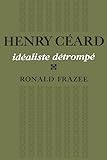Henry Céard : idéaliste détrompé / Ronald Frazee.
Material type: TextSeries: University of Toronto Romance SeriesPublisher: Toronto : University of Toronto Press, [1963]Copyright date: 1963Description: 1 online resource (200 p.)Content type:
TextSeries: University of Toronto Romance SeriesPublisher: Toronto : University of Toronto Press, [1963]Copyright date: 1963Description: 1 online resource (200 p.)Content type: - 9781487598792
- 9781487595555
- 840.9007 23
- PQ146 .F739 1963
- online - DeGruyter
| Item type | Current library | Call number | URL | Status | Notes | Barcode | |
|---|---|---|---|---|---|---|---|
 eBook
eBook
|
Biblioteca "Angelicum" Pont. Univ. S.Tommaso d'Aquino Nuvola online | online - DeGruyter (Browse shelf(Opens below)) | Online access | Not for loan (Accesso limitato) | Accesso per gli utenti autorizzati / Access for authorized users | (dgr)9781487595555 |
Frontmatter -- AVERTISSEMENT -- PREMIÈRE PARTIE -- CHAPITRE PREMIER. VIE ET PERSONNALITÉ -- DEUXIÈME PARTIE -- CHAPITRE II. LE JOURNALISTE ET LE CRITIQUE -- CHAPITRE III. ROMANS ET NOUVELLES -- CHAPITRE IV. POÉSIE ET PIÈCES DE THÉÂTRE -- CHAPITRE V. CONCLUSION -- BIBLIOGRAPHIE -- INDEX -- TABLE DES MATIÈRES
restricted access online access with authorization star
http://purl.org/coar/access_right/c_16ec
Here for the first time is an authoritative account of the life and literary activity of a long-neglected writer of the French naturalist school. Its appearance now is especially timely in view of the recent revival of interest in Zola, Maupassant and Huysmans, and the publication of the complete Goncourt Journals. Céard's written works were virtually neglected by his contemporaries as well as by most historians of the naturalist movement. However, his novels, short stories, and plays had good critical receptions, and in providing this study of the author, as well as a comprehensive bibliography of all his works, Mr. Frazee is performing a valuable service for students of literature. As an artist Céard was perhaps less powerful than Zola or Goncourt, but one appreciates, as Mr. Frazee has noted, "la prédominance de l'esprit d'analyse sur l'esprit d'imagination." An important contribution was his early experimental novel Une belle journée; this explored in depth a single day in a character's life, and was the first of a number of such novels, which culminated in Joyce's Ulysses. While attempting to give Céard his due as an artist Mr. Frazee, in seeking to discover the relations between this paradoxical personality and his work, has not hesitated to point out Céard's personal failings. Céard was an intriguing blend of deceptive simplicity and surprising complexity, and he showed a pessimism and resignation, typical of the fin de siècle, which were evidence of the influence of Schopenhauer. Because secondary writers often give a better picture of their times than their better-known contemporaries, this biography, too, is able to shed new light on the last thirty years of the nineteenth century while providing an important guide for today's scholars and the future investigators of an important area of French literature.
Mode of access: Internet via World Wide Web.
In French.
Description based on online resource; title from PDF title page (publisher's Web site, viewed 20. Nov 2024)


